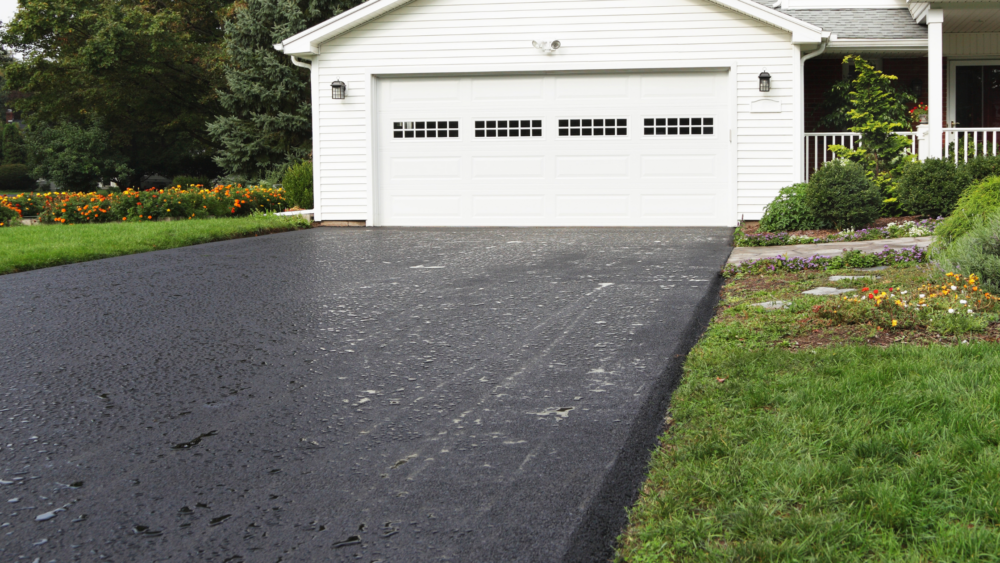Ever wonder why some driveways look as good as new years after installation while others crumble and crack? The secret lies in regular driveway maintenance. From asphalt to concrete, every surface needs a bit of TLC to withstand the test of time and weather. Let’s walk through how simple upkeep measures can save you money and hassle, keeping your entrance welcoming and safe.
Driveway Maintenance: Why It’s Important
Your driveway is the first thing people see when they pull up to your house. It’s like a red carpet, welcoming guests and setting the tone for your home’s curb appeal.
But here’s the thing: driveways take a beating. They’re constantly exposed to the elements, not to mention the daily wear and tear of vehicles driving on them. Over time, this can lead to cracks, potholes, and other damage that’s not only unsightly but also potentially dangerous.
Preventing Costly Repairs
Regular driveway maintenance is key to avoiding expensive repairs down the line. By taking care of small issues like cracks and stains early on, you can prevent them from turning into bigger problems that require major work.
Think of it like going to the dentist for regular cleanings. A little preventive care now can save you from needing a root canal later. The same goes for your driveway – a bit of upkeep can go a long way in extending its lifespan and saving you money in the long run.
Enhancing Home Value
A well-maintained driveway doesn’t just look nice – it can also boost your home’s value. According to a study by Remodeling Magazine, a new asphalt driveway has a 62.8% return on investment when it comes time to sell your home.
Even if you’re not planning to sell anytime soon, a driveway in good condition can make your home more attractive and inviting. It’s like putting your best foot forward and showing that you take pride in your property.
Safety Considerations
Beyond aesthetics and home value, driveway maintenance is also important for safety reasons. Watch out for those sneaky cracks, potholes, and uneven patches on the sidewalk—they’re not just annoying; they can send you sprawling or give your car a rough ride.
Imagine your elderly neighbor coming over for a visit and tripping on a crack in your driveway. Or picture your own car bottoming out on a pothole every time you pull in. These are scenarios that can be avoided with proper driveway care.
Common Driveway Types and Their Maintenance Needs
Not all driveways are created equal. The type of material your driveway is made of will determine the kind of maintenance it needs. Here’s a quick rundown of some common driveway types and their upkeep requirements:
Asphalt Driveways
Asphalt is a popular choice for driveways because it’s durable and relatively inexpensive. However, it does require some regular maintenance to keep it looking its best. This includes:
- Sealing every 2-3 years to prevent cracks and weathering
- Filling cracks and holes as soon as they appear
- Keeping the surface clean and free of debris
Concrete Driveways
Concrete driveways are known for their durability and low maintenance needs. However, they can still benefit from occasional upkeep, such as:
- Sealing every 3-5 years to protect against stains and weathering
- Cleaning with a pressure washer to remove dirt and grime
- Repairing cracks and chips as needed
Gravel Driveways
Gravel driveways are a low-cost option that can add a rustic charm to your home. To keep them looking their best, you’ll need to:
- Rake the gravel regularly to maintain an even surface
- Fill in any potholes or ruts that form
- Add fresh gravel every few years to replace what’s been lost
As Stacy Brown, director of training at Real Property Management, notes: “Gravel driveways aren’t maintenance-free, but they’re generally pretty low maintenance. You may need to fill potholes and add fresh gravel.”
Signs Your Driveway Needs Repair
Even with regular maintenance, driveways can still develop issues over time. Here are some signs that your driveway may need some TLC:
Cracks and Potholes
Cracks and potholes are not only unsightly, but they can also lead to further damage if left untreated. Water has this sneaky habit of slipping into cracks, freezing up, and forcing them wider, leading to even bigger headaches down the road.
If you notice any cracks or holes in your driveway, it’s important to fill them as soon as possible. For small cracks, a DIY crack filler can do the trick. But for larger issues, you may need to call in a professional.
Drainage Issues
Poor drainage can cause water to pool on your driveway, leading to cracks, potholes, and even foundation issues. If you notice standing water on your driveway after a rain, it’s a sign that you may have a drainage problem.
To fix drainage issues, you may need to regrade your driveway or install a drainage system. This sounds like a task best left to the pros who can take a good look at what’s going on and suggest the perfect fix.
Stains and Discoloration
Oil spills, a touch of rust, and various marks can really make your driveway show its age and look neglected. While these issues are mostly cosmetic, they can still detract from your home’s overall appearance.
For those pesky stains, why not give a degreaser or pressure washer a whirl? For tougher stains, you may need to use a specialized cleaner or even resurface the affected area.
DIY Driveway Maintenance Tips
While some driveway repairs are best left to the professionals, there are plenty of maintenance tasks you can do yourself to keep your driveway looking its best. Here are some DIY tips:
Cleaning and Sweeping
Regular cleaning and sweeping can go a long way in maintaining your driveway’s appearance. Use a broom or leaf blower to remove debris, and hose down the surface to remove dirt and grime.
For tougher stains, try using a pressure washer or a specialized cleaner. Just be sure to follow the manufacturer’s instructions and wear protective gear like gloves and goggles.
Filling Cracks
Small cracks can be filled with a DIY crack filler, which you can find at most hardware stores. Just be sure to choose a filler that’s appropriate for your driveway material (asphalt, concrete, etc.).
To fill cracks, start by cleaning out any debris or loose material. Then, apply the filler according to the package directions, smoothing it out with a putty knife or trowel. Let the filler dry completely before driving on the surface.
Sealing
Sealing your driveway every few years can help protect it from the elements and extend its lifespan. You can buy driveway sealer at most home improvement stores, and applying it is a relatively easy DIY project.
Before sealing, make sure your driveway is clean and dry. Then, apply the sealer using a brush, roller, or squeegee, following the manufacturer’s instructions. Let the sealer dry completely before walking or driving on the surface.
When to Call a Professional for Driveway Repairs
While DIY maintenance can go a long way in keeping your driveway in good shape, some repairs are best left to the professionals. Here are some signs that it’s time to call in the experts:
Extensive Cracks or Potholes
If your driveway has extensive cracking or large potholes, it’s time to call a pro. These issues can be difficult to repair on your own and may require specialized equipment or materials.
A pro can take a good look at the damage and suggest what’s best to fix it, be that filling in cracks, smoothing over potholes, or maybe even giving your driveway a complete makeover.
Significant Drainage Problems
If your driveway has major drainage issues, such as large pools of standing water or water flowing towards your foundation, it’s definitely time to call a professional.
A pro can identify the root cause of the problem and recommend solutions, such as regrading the driveway or installing a drainage system. They’re also there to make sure everything’s done right the first time, keeping any future headaches at bay.
Sunken or Uneven Sections
If parts of your driveway are sinking or uneven, it’s a sign of a bigger problem, such as soil erosion or foundation issues. This is not something you want to tackle on your own.
A professional can assess the issue and recommend the best solution, which may involve lifting and stabilizing the sunken sections or even replacing part of the driveway.
Seasonal Driveway Care
Besides the usual upkeep, don’t forget about those seasonal chores that will keep your driveway looking its best year-round. Here’s a quick seasonal guide:
Spring
- Clean and inspect your driveway for any damage that may have occurred over the winter
- Fill any cracks or potholes that have formed
- Consider sealing your driveway if it’s been a few years since the last application
Summer
- Keep your driveway clean by sweeping and hosing it down regularly
- Pull any weeds that may be growing in cracks or along the edges
- Be mindful of oil stains and clean them up promptly
Fall
- Clear fallen leaves and debris from your driveway to prevent staining and moisture buildup
- Inspect your driveway for any cracks or damage that may have occurred over the summer
- Make any necessary repairs before winter sets in
Winter
- Keep your driveway clear of snow and ice to prevent damage and improve safety
- Avoid using metal shovels or ice picks that can scratch or chip the surface
- Use a plastic shovel or snow blower instead
- Apply sand or kitty litter for traction, rather than salt which can damage the surface
Driveway Maintenance Costs and Budgeting
The cost of driveway maintenance will depend on factors like the size of your driveway, the material it’s made of, and the extent of any repairs needed. Here are some general cost guidelines:
- Sealing an asphalt driveway: $0.10 to $0.25 per square foot
- Filling asphalt cracks: $0.50 to $2.00 per linear foot
- Repairing asphalt potholes: $20 to $50 per square foot
- Sealing a concrete driveway: $0.15 to $0.30 per square foot
- Repairing concrete cracks: $1.50 to $3.00 per linear foot
- Resurfacing a concrete driveway: $3 to $7 per square foot
To budget for driveway maintenance, it’s a good idea to set aside some money each year for regular upkeep and repairs. A good rule of thumb is to budget about $100 per year for every 1,000 square feet of driveway.
Of course, the best way to save money on driveway maintenance is to stay on top of regular upkeep. By taking care of small issues before they turn into big problems, you can extend the life of your driveway and avoid costly repairs down the line.
Driveway Maintenance FAQs:
How do you take care of a concrete driveway?
Regularly clean it and seal cracks quickly. Use a concrete sealer every few years to protect against weather and stains.
What is the best thing to use for a driveway?
The best choice depends on your climate, budget, and style preference. Asphalt is popular for its durability and cost-effectiveness.
How do I stop my driveway from cracking?
Avoid heavy loads, seal it regularly, and fill any small cracks promptly to prevent water damage from expanding them.
What is the most maintenance free driveway?
Gravel driveways need minimal upkeep besides occasional leveling and filling in gaps. They’re affordable but less smooth than paved options.
Conclusion
In our journey through the ins-and-outs of effective driveway maintenance, we’ve seen that it doesn’t take an army or a hefty bank account to keep things looking sharp; just a little know-how and routine care.




